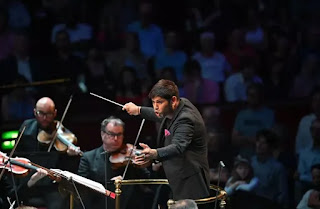Friday 26 August 2022
Prom 49: Glorious, tear-jerking Mahler 2 from Rattle and the London Symphony Orchestra at the Proms
Friday 12 August 2022
Prom 34: atmospheric Thorvaldsdottir and intimate Elgar from BBC Philharmonic
Kian Soltani (cello)
Eva Ollikainen
© Chris Christodoulou
Anna Thorvaldsdottir (b.1977): ARCHORA
Edward Elgar (1857-1934): Cello Concerto in E minor, Op. 85
Encore:
Trad., arr. Kian Soltani (b.1992): ‘Lovely Minka, I must away’
Jean Sibelius (1865-1957): Symphony No. 2 in D major, Op. 43
 |
| Anna Thorvaldsdottir & Eva Ollikainen © Chris Christodoulou |
'Ollikainen steered the BBC Philharmonic players through this dark landscape with a clear and expansive beat. Thorvaldsdottir uses the orchestra to create remarkably haunting atmospheres and textures'.
Elgar:
'Soltani's Elgar was strong, with command of the virtuosic demands a given and expressively singing tone in the slower moments'.
'Ollikainen succeeded in bringing each (tutti) back to allow for Soltani’s attention to detail to shine through'.

Kian Soltani
© Chris Christodoulou
'Nothing was overplayed or forced, and there was thoughtful attention to detail throughout'.
'There were moments where Ollikainen drove proceedings with greater energy, such as the immediate pulsing energy of the opening, and encouraging intensity of response from the violins in the build to the big tune'.
Read my full review on Bachtrack here.
Monday 1 August 2022
CD Reviews - August 2022
In this short disc, Italian pianist Alberto Nones performs the three works by Frédéric Chopin (1810-1849) with Fantaisie in the title. Nones’ approach here is to somewhat strip away the virtuosic fireworks to reveal the precise detail that sometimes gets lost in more overtly showy performances. This is very evident in the fluid Fantasie-Impromptu, Op. 66. The outer sections certainly flow here, apart from occasional halts in the momentum, and there is no compromise of tempo. The central section, however, could flow more, as there is extensive pulling about of the tempo here. But every detail can be heard, and the final section, whilst not as fiery as some other performances, is certainly impressive. In Fantasie, Op. 49, Nones’ approach is perhaps more successful, with its gentle opening to the drama that unfolds in a somewhat matter of fact way. Nones gives weight where needed, but the chorale like sections have a gentle simplicity. Nones gives the Polonaise-Fantaisie, Op. 61, a more stately, expectant opening, bridging well the transition from the recit-like statements into the flowing dance that finally gets going. There is a lightness here that allows the dancing melody to sing out, and the build to the virtuosic conclusion is not rushed or obscured by excessive weight. So whilst these might not be definitive recordings of these work, there is much to be savoured here in Nones’ refreshingly unfussy playing, revealing fresh insights into familiar works.
Chopin, F. 2022. Complete Fantasies. Alberto Nones. Compact Disc. Convivium Records CR074.
Somewhat slightly different territory for me now - another pianist recording with Convivium, but this time the Italian jazz pianist Matteo Bisbano Memmo. Clearly a highly virtuosic pianist, he demonstrates this with some astonishing playing in the first half of the disc, a selection of standards, with a number of arrangements from the extraordinary Art Tatum. Here, Bisbano shows no fear, with rippling fluidity and startling virtuosity in Charlie Mingus' 'Duke Ellington's Sound of Love', and the wild, fiendishly racing 'Tiger Rag'. There is some lightness of touch in 'Alfonsina Y El Mar', and softness in the rich chords of 'Yesterdays', but mostly the requirements of the extreme virtuosity does lead to a somewhat harshly percussive sound in places. However, in the second half of the disc, Bisbano moves to a selection of his own compositions, and the mood is completely different. The virtuosity is still evident, in the driving energy of the extended composition, 'Metalknife', for example, but there is also more dynamic variety in the lively, urban 'Smokey Stogie', and enigmatic, more lyrical writing in 'Rose'. He uses the open piano strings effectively at the mysterious start of 'Metalknife', and the atmospheric, slow-moving harmonies in 'Stardust Light' are highly effective. And what to finish with? Well, a cover of Metallica's 'Master of Puppets', of course. He captures the relentless drive and percussive hammering here, once again with highly virtuosic playing, but there are also moments of sudden delicacy in the brief lyrical interludes. Overall, this is an impressive display of virtuosic talent, but for me, it is in his more expressively varied own compositions that Bisbano's pianistic voice shines.
Various. 2022. Metalknife - Music for modern piano. Matteo Bisbano Memmo. Compact Disc. Convivium Records CR066.
(Edited versions of these reviews first appeared in Scene, August 2022)
Prom 18: Infectious dynamism from Currie, assured Bruckner and Shostakovich from the BBC SSO
 |
| Alpesh Chauhan & the BBC SSO © Chris Christodoulou |
 |
| Colin Currie © Chris Christodoulou |
Nicole Lizée (b.1973): Blurr is the Colour of My True Love’s Eyes, Percussion Concerto
Anton Bruckner (1824-1896), arr. Stanisław Skrowaczewski (1923-2017): String Quintet in F major, WAB112, Adagio
Dimitry Shostakovich (1906-1975): Symphony No. 5 in D minor, Op. 47
 |
| Colin Currie and purple cello © Chris Christodoulou |
'Chauhan steered the orchestra with precision through the complexities of rhythm and rapid tempo shifts and Currie’s infectious dynamism made for an exciting performance'.
Bruckner:
'An impressive intensity of emotion, with Chauhan weaving the string textures together with confident command'.
Shostakovich:
'Confident playing throughout, strong solo work from many, bright brass, and once again, some extremely quiet string playing'.
'A highly assured performance that just didn’t quite reach the full height of intensity on the night'.
Read my full review on Bachtrack here.





